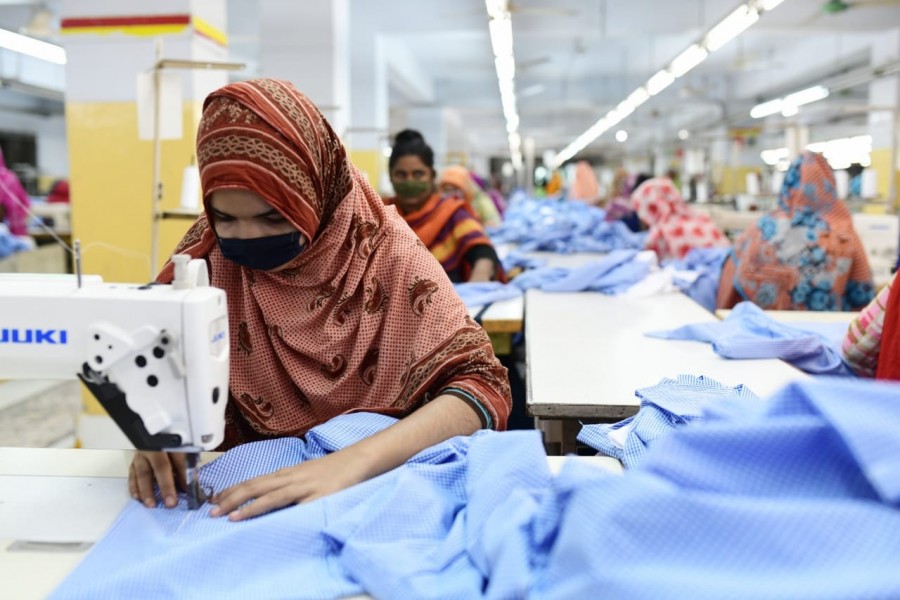The work orders for the country's struggling readymade garment (RMG) industry have started coming in, though not in a large amount, at heavy bargain prices.
The price on average witnessed 14 per cent fall as reflected from the orders confirmed so far this month (July) for delivering during the period from July to December this year, according to a latest survey conducted by the Bangladesh Garment Manufacturers and Exporters Association (BGMEA).
The industry has so far booked orders that would constitute only 35 per cent of its total production capacity for the first half of the current fiscal year (FY 2020-21).
In July, the industry has received 56 per cent work orders compared to that of the last year, claimed the trade body.
The survey titled "Analysis of Factory Capacity Booking Survey' was conducted on its 100 members and revealed the findings on Friday night.
"On an average, the price trend has been showing a 14 per cent dip in the second half of 2020 as compared to last year."
Men's undergarments had the highest price decline of 43 per cent, followed by baby items with a 35 per cent decline in price, according to the survey.
Only knitted bottoms got a price hike of 6.0 per cent this year, it showed.
"In July, the percentage of booking is 56 per cent of the industry's total production capacity. Considering the consolidated booking status for the second half of 2020 calendar year, only 35 per cent of the total capacity has been booked," according to the findings.
It showed that the surveyed members, in July'20, have received confirmed work orders worth 34. 46 million pieces against their production capacity of 61.32 million pieces.
In July'19, Bangladesh fetched US$ 3.31 billion from RMG exports, according to BGMEA data. RMG export earnings stood at $1.97 billion until July 22 which was 2.15 billion in the corresponding period of last July.
When asked, BGMEA president Dr Rubana Huq said that the survey was conducted to analyse the impact of Covid-19 on the work orders and prices of readymade garment (RMG) items.
The export data until July 22 showed that the RMG export during the period declined by 8.43 per cent or around $200 million.
The rate of deceleration in exports has slowed down, which is certainly a positive sign for the industry, she said. However, she added, this might not necessarily indicate new order placements by the buyers, but reinstatement of the previous ones those were cancelled of suspended immediately after the outbreak of coronavirus.
She also noted that the industry has lost US$ 4.33 billion worth of exports during the period from March to June, and the industry's growth is yet to reach the positive trend.
The survey revealed that the apparel makers booked 48 per cent, 38 per cent and 30 per cent confirmed work orders against their capacity for the month of August, September and October next respectively.
About 21 per cent and 17 per cent of their capacity have so far been booked for November and December respectively, it showed.
Industry people, however, said that there is still time to get orders for the period from October to December.
In the meantime, when the industry is struggling to utilize their full capacity in absence of work orders, the ministry of labour and employment in a circular issued on July 16 waived the export-oriented RMG industry conditionally from the obligation of labour law provision 100, 102 and 105 related to working hours for six months since April 17 last.
Industry people explained that any export-oriented RMG factory is allowed to ask its workers to do overtime more than four hours a day on conditions.
Responding over the issue, BGMEA PR committee chairman Khan Monirul Alam said when factories reopened at end April, they had a lot of unfinished work because of closure of the factories for one month.
After reopening, they had to finish quickly the unfinished works to avoid further cancellation as the buyers were giving extremely strict deadlines because of missed deadlines the month before. He said extended overtime (OT) is not allowed according to the compliance.
That's why extended OT was allowed by MoLE and instead of case to case it was allowed for six months because of the situation created before, he explained.
On the other hand, the government has disbursed a total of TK 75 billion to pay the workers' wages of export-oriented industries, mostly RMG, for three months from April last.
Recently, the government has announced another fund of Tk 30 billion as soft loan for the export-oriented industries, mainly garments, to pay workers' wages for the month of July.
Talking to the FE, Nazma Akter, a labour leader, said the garment owners and its sector leaders are taking benefits from the government during the outbreak of coronavirus through providing one-sided information.
The workers are being deprived as thousands of workers are being terminated, without any lawful benefits in many cases, despite the government's instruction for not doing the same, she alleged, requesting the government to strictly monitor the situation and ensure lawful benefits in case of termination.
"Even workers are not getting timely the monthly wages while they are working amid risks of coronavirus infection as factory managements are not properly taking health safety related measures," she alleged.


